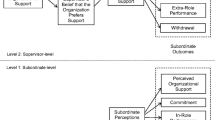Abstract
The study investigated employee perceptions about the reward or punishment values inherent in a variety of supervisor actions. Actions viewed as most rewarding were generally actions that possessed (a) public visibility, (b) tangibility, (c) implied esteem, and (d) long-term implications. Actions viewed as punishing or aversive involved similar characteristics. Visibility appeared to be most strongly related to perceived severity. In contrast with suggestions in the literature (cf. León, 1981), substantial levels of agreement among raters were found for aversive as well as rewarding actions. Also reviewed are characteristics of leader actions that received mixed ratings from respondents.
Similar content being viewed by others
References
Arvey, R. D., & Ivancevich, J. M. Punishment in organizations: A review, propositions, and research suggestions.Academy of Management Review 1980,5 123–132.
Cherrington, D. J., Reitz, H. J., & Scott, W. E., Jr. Effects of contingent and non-contingent reward on the relationship between satisfaction and task performance.Journal of Applied Psychology 1971,55 531–536.
DeLeo, P. J., & Pritchard, R. D. An examination of some methodological problems in testing expectancy-valence models with survey techniques.Organizational Behavior and Human Performance 1974,12 143–148.
Greene, C. N. Causal connections among manager's pay, job satisfaction and performance.Journal of Applied Psychology 1973,58 95–100.
Hackman, J. E., & Lawler, E. E. Employee reactions to job characteristics.Journal of Applied Psychology Monograph 1971,55 259–286.
Hamner, W. C. How to ruin motivation with pay. In R. M. Steers & L. W. Porter (Eds.),Motivation and work behavior (2nd ed.). New York: McGraw-Hill, 1979.
Jurgenson, C. E. Job preferences (What makes a job good or bad?).Journal of Applied Psychology 1978,63 267–276.
Keller, R. T., & Szilagyi, A. D. Employee reactions to leader reward behavior.Academy of Management Journal 1976,19 619–627.
Kleeman, R. How to deal with the nonproductive federal employee.Civil Service Journal, 1979, April/June, 46–48.
Lawler, E. E.Pay and organizational effectiveness: A psychological review New York: McGraw-Hill, 1971.
León, F. R. The role of positive and negative outcomes in the causation of motivational forces.Journal of Applied Psychology 1981,66 45–53.
Meyer, H. H. The pay for performance dilemma.Organizational Dynamics 1975,3 39–50.
Mitchell, T. R., Green, S. G., & Wood, R. E. An attributional model of leadership and the poor performing subordinate: Development and validation. In L. L. Cummings & B. M. Staw (Eds.),Research in organizational behavior (Vol. 3). Greenwich, Connecticut: JAI Press, 1981.
Oldham, G. R. The motivational strategies used by supervisors: Relationships to effectiveness indicators.Organizational Behavior and Human Performance 1976,15 66–86.
Reitz, H. J. Managerial attitudes and perceived contingencies between performance and organizational response.Academy of Management Proceedings (31st Annual Meeting). 1971, pp. 227–238.
Sims, H. P., Jr. Further thoughts on punishment in organizations.Academy of Management Review 1980,5 133–138.
Sims, H. P., & Szilagyi, A. D. Leader reward behavior and subordinate satisfaction and performance.Organizational Behavior and Human Performance 1975,14 426–438.
Steers, R. M., & Porter, L. W.Motivation and work behavior (2nd ed.). New York: McGraw-Hill, 1979.
Szilagyi, A. D. Causal inferences between leader reward behavior and subordinate performance, absenteeism, and work satisfaction.Journal of Occupational Psychology 1980,58 195–204.
Tornow, W. W. The development and application of an input/outcome moderator test on the perception and reduction of inequity.Organizational Behavior and Human Performance 1971,6 614–638.
Author information
Authors and Affiliations
Additional information
Support for this research was provided under Office of Naval Research Contracts RR042-08-01 and N 00014-81-K-0824. Opinions expressed are those of the authors. No endorsement by the Department of the Navy has been given or should be inferred. The authors would like to thank Richard Arvey, Linda Dutton, Steven Fox, and R. J. Bullock for their assistance and comments.
Rights and permissions
About this article
Cite this article
Jones, A.P., Tait, M. & Butler, M.C. Perceived punishment and reward values of supervisor actions. Motiv Emot 7, 313–329 (1983). https://doi.org/10.1007/BF00991681
Issue Date:
DOI: https://doi.org/10.1007/BF00991681




